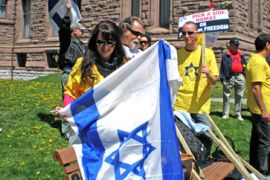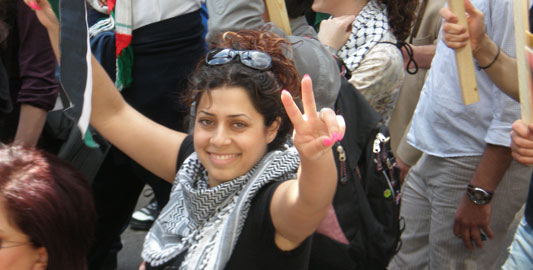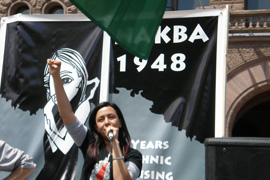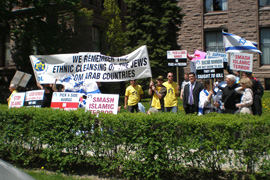Canada’s Jews, Arabs on 1948
Far from the Middle East, two communities mark 1948 in different ways.

 |
| A rally was held to commemmorate the Nakba and the plight of the Palestinian people since 1948 [TANIA TABAR] |
As Tel Aviv celebrates the anniversary of its independence and creation, Jews and Israelis in Toronto recently adopted the catchphrase “Party like its 1948” to re-capture the euphoria they felt 60 years ago.
Gidalya, a young Israeli-Canadian high school student attending one of the pro-Israel rallies, told Al Jazeera that the Jewish state plays a central role in her life.
“I think the Jews need a homeland. I am willing to fight for my country; I plan on joining the [Israeli] army,” she said.
“No one thought Israel would make it [and] now the country is still going sharp.”
Seven thousand people, young and old, in attendance at a Toronto coliseum to praise the Jewish state, agreed with Gidalya.
When Stephen Harper, the Canadian prime minister, arrived to express “Canada’s unshakable support for Israel,” he received a standing ovation as youth dressed in blue and white shirts, flags draping from their backs, danced and saluted the state of Israel.
Celebrating “ethnic cleansing”
 |
| Palestinians say ethnic cleansing paved the way for the creation of Israel [TABAR] |
But elsewhere in Toronto, members of the Arab and Palestinian communities held their own rally earlier this week saying “there is no reason to party and celebrate ethnic cleansing”.
They said the creation of Israel in 1948 spawned the Nakba, or catastrophe.
Farid Ayad, president of Palestine House Educational and Cultural centre, said “a carefully-executed and externally-supported plan, which is unprecedented in modern history,” led to the uprooting of a whole society from their homes in Palestine in 1948.
“Today we are celebrating, not the Nakba, but we are celebrating the existence and the continuation of the Palestinian people to prove that they are part of that land,” he told Al Jazeera.
Palestinians say that in the period of 1947-48, over 500 Palestinian towns and villages were destroyed and two-thirds of the population were expelled from their lands, creating what is now one of the largest refugee populations in the world.
Expressing their support for those refugees, about 500-600 Palestinians and activists rallied and marched in the streets of Toronto on Saturday, demanding justice, and the right of return for the displaced.
“Just as Zionists are celebrating 60 years of their state, we want to show them that we are still existing,” said Zeina Adelmajid at the rally last week.
“We are no less human than anyone living in Canada. We want justice just as much as Israelis want justice. We want to be able to return and live with them,” said third-generation Palestinian refugee, Rafeef Ziadah, whose grandfather was displaced from Haifa to a refugee camp in Lebanon, and died without ever seeing his hometown again.
Naji Farah, a Palestinian writer and former teacher who was 15 years old in 1948, believes the Nakba has continued to the present day.
“It has continued and is in progress in the West Bank where settlers rob day after day more Palestinian lands, and in the Gaza Strip where people live under siege, where children cannot find something to eat, where mothers cannot buy medication for their children … this is a continuation of the Nakba.”
Lies and hate?
 |
| Canadian Jews held a counter demonstration calling for an end to “Islamic terror” [Tabar] |
But Irena Rogochebsky, a young Israeli who lives in Toronto, and goes back to Israel on regular visits, dismissed talk of the Nakba.
“This is putting the blame on people, on a country where people go to escape problems,” she said as she stood among some 20 people at a pro-Israel counter-demonstration organised by the Jewish Defence League (JDL).
“They [Palestinians] are going around telling lies, perpetuating hate in Canada where my family went to escape it. We did not create the Nakba. When [Palestinians] left in 1948, Arab countries did not grant them citizenship, that is how they became refugees,” she added.
Rogochebsky sees Israel as the only place where Jews can practice their religion without fear, but believes Arabs do not want them there.
“I do not think that there is an occupation. I think there are security measures being taken. Because of hostilities there has to be protection and those areas need to be patrolled by soldiers because there are people trying to kill Israelis.”
Mike Snider, a member of the JDL fears the destruction of Israel. “If the Arabs put down there weapons there will be peace. If the Israelis put down their weapons, Israel will be destroyed.”
Seeking co-existence
A member of Women in Solidarity for Palestine, Reena Katz is part of a progressive Jewish voice, that she says is rarely heard in the mainstream media.
“Considering what Stephen Harper said this week regarding the Jewish community in Canada, I feel it is particularity important to speak out as a Jew against Zionism,” she said.
For Katz, who believes in one democratic state for Palestinians and Israelis, the issue is not rooted in religious differences, but stems of colonialist mechanisms.
“People were favoured by colonial state and given a piece of land that did not belong to them. Palestinians are not only Muslim, they are Christian; they are secular, and they are Muslim,” she said.
“It is not an issue of which God gave people this land. The issue for me is human rights and justice.”
Fadi Hajjaj, a young Palestinian who has family in Israel and Palestine, and visits on a regular basis, shares a similar belief – an end to Zionism and one state for all.
“There is no question I would live side by side with Jews, they are part of the land too, as we are.”